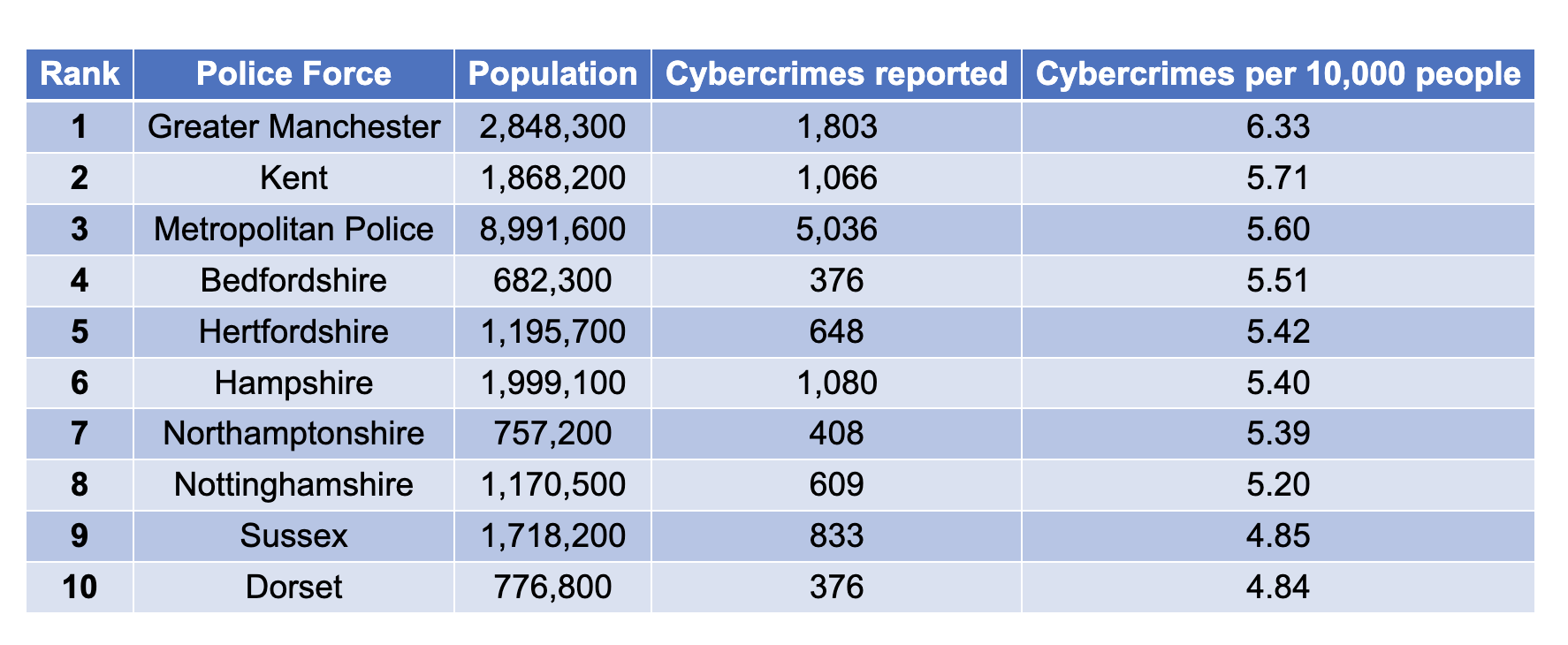Comments
- No comments found

The Greater Manchester area has the highest risk of cybercrime among residents, followed by Kent and the Metropolitan area.
The study by cyber security experts CloudTech24 analysed the latest data available from the National Fraud & Cyber Crime Reporting Centre to see which areas reported the highest levels of cybercrime for every 10,000 people.
It found that residents of the Greater Manchester area were most susceptible to cybercrime, with Greater Manchester receiving 1,803 cybercrime reports in the last 13 months, which equates to around 6.33 reports per 10,000 people, the highest of any area. The most commonly reported types of cybercrime include the hacking of personal information and the hacking of social media or email accounts.
Coming in second place is the Kent area, which reported 1,066 cybercrimes in the time of the study, which is equivalent to around 5.71 reports per 10,000 people. Approximately half of these reports were for hacking social media and email accounts.
The Metropolitan Police area, which covers Greater London, comes in third place. 5,036 cybercrime reports were received in the last 13 months by the Metropolitan Police, which equates to around 5.60 reports per 10,000 people. Once again, the most widely reported cybercrime was the hacking of social media and email accounts, as well as the hacking of personal information, followed by computer viruses or malware.
Taking fourth place on the list is the Bedfordshire area, with Bedfordshire Police receiving 376 cybercrime reports during the time of the study, equivalent to 5.51 reports per 10,000 people. Most reports also came in for social media and email account hacking.
Rounding out the top five is the Hertfordshire area, where in the last 13 months, there were 648 cybercrime reports or 5.42 reports per 10,000 people. Social media and email account hacking were the most common reports, followed by computer viruses or malware cases.

Commenting on the findings, a spokesperson for CloudTech24 said: “It’s interesting to see how cybercrime can affect everyone, regardless of location, with the top ten areas being very spread out across the country. The data indicates that the most common type of crime is hacking of social media and email, which highlights how important it is for people to be vigilant about online threats, both in their personal lives and at work.”
It is important for individuals and organizations to be aware of the potential risks and take appropriate measures to protect themselves. This can include using strong passwords, regularly updating software and security systems, and being cautious of suspicious emails and messages.
There are several steps that you can take to protect yourself from cybercrime:
Use strong and unique passwords: Create strong passwords that are at least 12 characters long and include a mix of uppercase and lowercase letters, numbers, and symbols. Use a different password for each account and use a password manager to keep track of them.
Keep your software up to date: Regularly update your operating system, software, and applications with the latest security patches and updates. This helps to close any vulnerabilities that cybercriminals may exploit.
Use two-factor authentication (2FA): Enable two-factor authentication wherever possible, which requires a second form of verification in addition to your password. This makes it more difficult for cybercriminals to gain access to your accounts.
Be cautious of suspicious emails and messages: Be wary of unsolicited emails, messages, and phone calls. Do not click on links or download attachments from unknown sources and avoid sharing personal information unless you are sure it is safe to do so.
Use antivirus and anti-malware software: Install and regularly update antivirus and anti-malware software to protect your computer and mobile devices from malicious software.
Backup your data: Regularly backup your important data to an external hard drive or cloud-based storage service. This ensures that you have a copy of your data in case it is lost or stolen.
Educate yourself: Stay informed about the latest threats and tactics used by cybercriminals. Attend cybersecurity training and follow best practices for online safety and security.
By taking these steps, you can help to protect yourself from cybercrime and reduce the risk of becoming a victim.
Leave your comments
Post comment as a guest